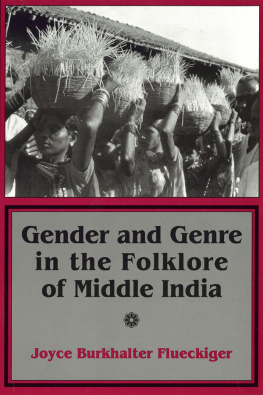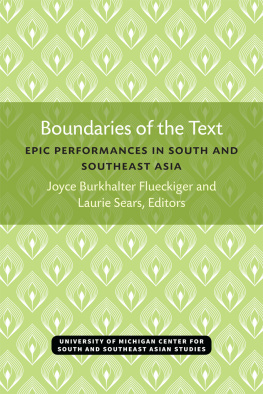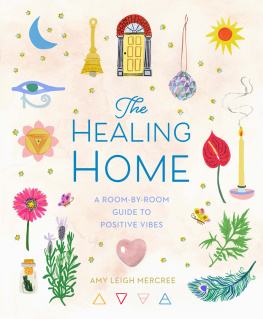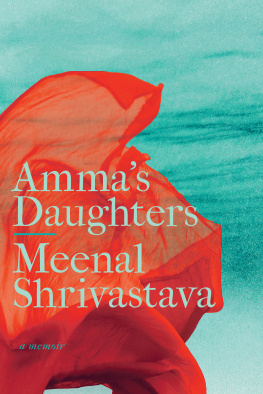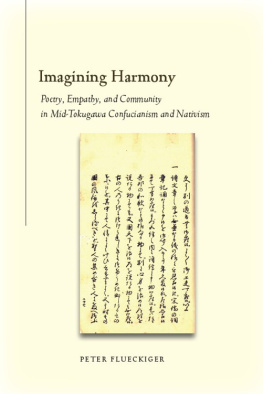IN AMMAS HEALING ROOM
IN AMMAS HEALING ROOM
GENDER AND VERNACULAR ISLAM IN SOUTH INDIA
Joyce Burkhalter Flueckiger
INDIANA UNIVERSITY PRESS
BLOOMINGTON AND INDIANAPOLIS
This book is a publication of
Indiana University Press
601 North Morton Street
Bloomington, IN 47404-3797 USA
http://iupress.indiana.edu
Telephone orders 800-842-6796
Fax orders 812-855-7931
Orders by e-mail
2006 by Joyce Burkhalter Flueckiger
All rights reserved
No part of this book may be reproduced or utilized in any form or by any means, electronic or mechanical, including photocopying and recording, or by any information storage and retrieval system, without permission in writing from the publisher. The Association of American University Presses Resolution on Permissions constitutes the only exception to this prohibition.
The paper used in this publication meets the minimum requirements of American National Standard for Information SciencesPermanence of Paper for Printed Library Materials, ANSI Z39.48-1984.
Manufactured in the United States of America
Library of Congress Cataloging-in-Publication Data
Flueckiger, Joyce Burkhalter.
In Ammas healing room : gender and vernacular Islam in South India / Joyce Burkhalter Flueckiger. p. cm.
Includes bibliographical references and index.
ISBN 0253-347211 (cloth : alk. paper)ISBN 0253-218373 (pbk. : alk. paper)
1. Muslim womenIndiaHyderabad (District) 2. HealersIndiaHyderabad (District)Biography. 3. Hyderabad (India : District)Social life and customs. I. Title.
HQ1744.M93F58 2006
305.48'69739dc22 2005019837
1 2 3 4 5 11 10 09 08 07 06
Dedicated to Amma and Abba
Who opened their home, healing room, and hearts, and
Who continue to influence many lives on both sides of the seven seas
Amma and Abba, 1996
No matter how many books you write, Jo-ice, that knowledge will be incomplete. No matter how much you write, it wont be enough. Even if you used all the trees in the universe as pens, even then.
Allah has decreed that even if you use up all the ink of the water of the oceans and all the pens from the trees of the world, even then, you wont have finished the history of the kalm.
Amma, March 2, 1995
CONTENTS
PREFACE
This book is an ethnographic study of Islamic practices centered around a Muslim female spiritual healer, Amma, who lives and practices in the South Indian city of Hyderabad. Her healing practice represents a form of vernacular Islam as it has taken root in and grown out of a particular locality. Two features are particularly noticeable at this site of vernacular practice in Ammas healing room: gender roles and negotiations and the ways in which Islam has taken shape in its Indian context. Because of Ammas unusual ritual role as a female Muslim healer practicing in the public realm, many of the actors in the healing room articulate issues of gender roles and possibilities. As a woman, Amma has to continually recreate and maintain her authority as a healer to meet the public, which includes Hindus and Muslims, men and women. At the same time, many of her patients come to her because she is a woman who is thought to be more patient and loving than male healers.
A second characteristic of the healing room is that patients come to Amma for spiritual healing from several different Indian religious traditions: Islam, Hinduism, and Christianity. For scholars and students of religion, this raises the question What makes religious healing possible across religious boundaries? One indigenous answer, as Amma gives it, is that in the healing room, these boundaries of difference collapse. Patients share a cosmology that articulates healing as a spiritual idiom in which spiritual beings or forces intervene in the physical and social world to cause illness. A ritual grammar is shared, and many narrative repertoires and motifs are shared across religious boundaries. At this level of spiritual practice, seemingly rigid boundaries between Indian religious traditions are porous and unsettled. In Ammas Healing Room is a study of particular expressions of vernacular Islam that reveal to us the potential flexibility and creativity of Islam, a tradition that is often viewed by both Muslims and non-Muslims alike to be universal, singular, and monolithic.
Religious healing practices are more often written about by medical anthropologists than religious studies scholars. But since practitioners of the kinds of healing Amma engages in think of themselves primarily as religious practitioners, it is important for scholars of religion to expand the boundaries of what counts to include these expressions of vernacular religious traditions. Even as I have made clear that my primary interest in my work with Amma is to understand how her healing practice works internally as a religious system and, more particularly, how gendered and religious identities are performed and/or negotiated at this level of practice, audience members who have heard me speak about this healing practice (at numerous conferences, in classes, etc.) frequently push me to answer whether or not I think it works. When they ask How does it work? they are really interested in knowing Does it work according to the terms in which we who live outside this social/religious system would identify as successful? So here in the preface, I will attempt to address this question.
Let me begin with a story. When I first met Amma in January 1989, I was not employed as a university professor but was working part-time as an editor and was between two postdoctoral research grants. Amma and her patients were slightly aghast that I did not have a permanent academic position when I had had a Ph.D. for five years. And so, at the end of that first extended three-week visit to Ammas healing room, she gave me an amulet so I would get a permanent position. I accepted the amulet as a gift of love and carried it with me in my handbag, as Amma had instructed, but did not really think about its potential effects. However, a series of events followed (and had preceded) that, in retrospect, seem serendipitous: due to an unexpected tangle of bureaucratic decisions by the government of India, I was unable to return to the site where I had done my Ph.D. fieldwork in Chhattisgarh. Because of this I was free to return to work with Amma the following year instead of going back to Chhattisgarh. Before I returned to do this work, I had mentally taken myself off the market for jobs in the field of Hindi language and literature, for which there had only been four openings in the previous eight years. My Ph.D. fieldwork had been ethnographic but in the field of folklore; my resulting book, Gender and Genre in the Folklore of Middle India (1996), concerns indigenous conceptions of genresomething I had thought could be stretched as relevant to teaching South Asian languages and literatures. By taking myself off this job market, I was free to conduct ethnographic fieldwork that could not in any way be construed as contributing to the field of literature.
When I returned from my first fieldwork stint (of two months) with Amma, a tenure-track position was advertised at Emory University in the Department of Religion for someone who did performance studies; preference would be given to someone who worked with nonwestern traditions and gender, and, if all other things were equal, preference would be given to someone who worked with Islamic traditions. My work with Amma fulfilled these requirements in a way that my earlier fieldwork in Chhattisgarh did not. My job talk for this position was based on those first two months of fieldwork with Amma, and I was offered the position. Amma would say that it was her amulet that led to this successful conclusion, and indirectly, I would have to concur: meeting Amma changed the direction of my research interests and introduced me to Islam on a personal and intellectual level that I had not been exposed to earlier, and my work with Amma gave me courage to apply to a position that was outside my interdisciplinary field of South Asian Languages and Literatures.




